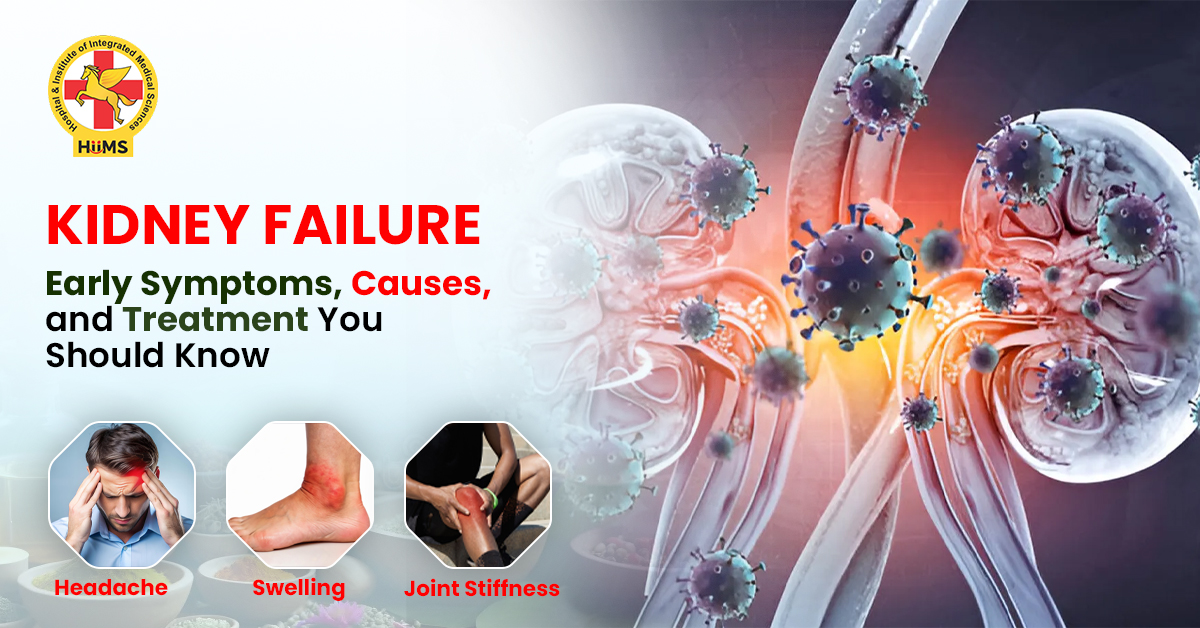Kidney failure is a serious health condition that often develops silently over time. These bean-shaped organs are responsible for filtering waste and excess fluids from the blood. When they start to lose their ability to function effectively, toxins begin to accumulate, which can affect overall health. Understanding kidney failure and its early signs is essential for timely intervention and effective management.
In India, nearly 2-3% of adults experience some stage of kidney dysfunction each year. Many people only discover the problem during routine check-ups, as early symptoms are subtle and easily overlooked. Recognizing kidney failure symptoms early can make a significant difference in recovery and long-term health.
Early Signs of Kidney Failure You Shouldn’t Ignore
Kidneys do not usually send clear warnings when something is wrong. The symptoms creep in gradually and can easily be mistaken for normal tiredness or other health issues. Some of the common signs of kidney failure include:
- Persistent fatigue or weakness: Feeling unusually tired even after proper rest
- Swelling (edema): Puffiness around the eyes, ankles, or feet due to fluid retention
- Changes in urine: Either producing too little or too much urine, or noticing foam or blood
- Nausea or vomiting: Often accompanied by a metallic taste in the mouth
- Itchy, dry skin or shortness of breath: Caused by toxin buildup in the body
If you notice any of these symptoms, it’s important to consult a healthcare professional promptly. Early recognition of symptoms of kidney failure allows for timely management and can prevent serious complications.
Causes of Kidney Failure
Kidney failure is rarely caused by a single factor. In most cases, it is the result of multiple contributing factors over time. Understanding what causes kidney failure can help in prevention and management. Some common causes of kidney failure include:
- Diabetes and high blood pressure: Long-term high blood sugar or elevated blood pressure puts immense strain on the kidneys.
- Chronic kidney infections or inflammation: Repeated infections can gradually damage kidney tissue
- Certain medications: Long-term use of some painkillers, antibiotics, or other drugs may harm the kidneys
- Dehydration and poor diet: Diets high in salt, sugar, or processed foods can increase kidney stress
- Obstructions in the urinary tract: Kidney stones or other blockages may reduce kidney function
Simply put, kidney failure happens when the kidneys cannot keep up with the demands placed on them by lifestyle, medical conditions, or other health factors.
How to Prevent Kidney Failure
Prevention is always better than treatment, especially for organs as vital as the kidneys. Simple lifestyle adjustments can help maintain kidney health and reduce the risk of failure. Here are some practical steps:
- Stay hydrated: Drinking adequate water helps the kidneys flush out toxins efficiently
- Eat a balanced diet: Focus on fresh fruits, vegetables, whole grains, and foods low in salt and processed sugar
- Monitor blood sugar and blood pressure: Keeping these levels in check reduces kidney strain
- Exercise regularly: Physical activity improves circulation and supports overall kidney function
- Avoid excessive use of medications that stress the kidneys: Consult a doctor before long-term use of painkillers or other potentially harmful drugs
- Regular health check-ups: Routine kidney function tests help catch early changes before serious damage occurs
Implementing these habits consistently can significantly lower the risk of kidney failure.
Treatment Options for Kidney Failure
Kidney failure treatment depends on the stage of the condition. In early stages, lifestyle adjustments, dietary changes, and medical management can help slow progression and maintain kidney function. Managing underlying causes such as diabetes or hypertension is also critical.
For advanced kidney failure, more intensive treatments may be required. These treatments aim to replace kidney function and prevent life-threatening complications. The key takeaway is that early detection and intervention make a significant difference in outcomes.
Other Conditions Our Doctors Address
At our center, healthcare professionals not only focus on kidney health but also provide care for a range of related and chronic conditions. These include:
- Diabetes management
- High blood pressure and heart-related issues
- Liver disorders and jaundice
- Cancer support and preventive guidance
- Digestive health concerns
- Autoimmune conditions
A holistic approach ensures that patients receive guidance to maintain overall health, not just treat a single organ issue.
Conclusion
Kidney failure doesn’t happen overnight. It’s a slow decline in the kidneys’ ability to filter blood and maintain the body’s balance. Recognizing kidney failure symptoms, understanding the causes of kidney failure, and taking proactive measures can prevent serious complications. With proper care, lifestyle changes, and early medical intervention, kidney failure treatment can be highly effective, helping patients maintain kidney function and overall well-being. Remember, prevention, awareness, and timely action are key.
At Jeena Sikho HiIMS, experienced doctors guide patients through early detection, management, and natural approaches to support kidney health and overall wellness. Their focus on holistic care ensures that patients receive long-term solutions, not just temporary relief.
Take charge of your kidney health with expert, holistic guidance. Book your appointment today to begin your journey toward stronger kidneys and better overall wellness.
About the Author
Dr. Ravinder Kaur is an Ayurvedic physician with 16 years of clinical experience, known for her gentle yet effective healing approach. While she treats a wide range of chronic lifestyle disorders, her special expertise lies in kidney-related conditions, from chronic kidney disease and renal weakness to urine infections, swelling, and toxin accumulation. Her philosophy is simple: support the body’s healing intelligence, restore balance at the root level, and create long-term recovery rather than temporary relief.
FAQs
1. What are the early symptoms of kidney failure?
A: Early signs include fatigue, swelling around the eyes or feet, nausea, changes in urine, and dry or itchy skin.
2. Can kidney failure be prevented naturally?
A: Yes. Maintaining hydration, a balanced diet, regular exercise, and controlling blood sugar and blood pressure can reduce risk.
3. What causes kidney failure?
A: Common causes include diabetes, high blood pressure, kidney infections, dehydration, urinary tract obstructions, and certain medications.
4. How is kidney failure treated?
A: Treatment depends on the stage. Early stages may be managed with lifestyle changes and medical management, while advanced stages may require intensive interventions.
5. Are there other conditions related to kidney health?
A: Yes. Conditions like diabetes, hypertension, liver disorders, and autoimmune issues often affect kidney function, highlighting the importance of holistic health management.


